Embrace 'Once in a Lifetime' Opportunities to Care and Make a Difference, MIP Student Speaker Reminds Graduates
Below is a transcript of remarks by Miku Yamada, MIP '23, at the diploma ceremony for Ford Dorsey Master's in International Policy graduates on June 18, 2023.
Dear esteemed professors and faculty, distinguished guests, parents, families and friends from all over the world. Welcome to the graduation ceremony of the MIP class of 2023. Dear Class of 2023, we made it!
I am honored to be here today to congratulate the achievements of this wonderful group of people, that I am so proud to be a part of.
Our class is a small, but extremely diverse and dynamic group. For some of us, Stanford is a drive away from home, and for others it is a 15-hour flight. We come from 17 countries, and from a broad range of experiences and expertise. To name just a few, Kyle and Brian came from years of service in the U.S. military. Ben and Angela were successfully running their own companies. Mi Jin, Will, and I came from working on national security and foreign policy in our governments.
It’s a miracle that we all decided to go to grad school even amid the pandemic, and gathered here from all over the world. Each and every one of us made this journey as special as it was. And behind all of us are our families, friends, and mentors, without whom we would not be here, and who supported us every step of the way. I personally want to thank my family, for always believing in me, and especially my mom, who flew out all the way from Japan to celebrate this time with me.
I also want to take a moment to express my heartfelt gratitude to the people who made all of this possible- the FSI and MIP staff. Ambassador McFaul, for always inspiring us to strive to create impact through our actions, and to value this community. Professor Fukuyama, for his wonderful leadership, and for making sure we know the MIP Problem-Solving Framework like the back of our hand. Chonira, for not only being the best Global Economy professor, but for being the backbone of the program, and our cheerleader. Jonathan, Maeve, Meghan, Patrick, Cheng, and Laleh for dealing with all of our questions and requests and somehow catering to all of our extremely diverse interests and needs.
At Stanford, this MIP cohort quickly became my family. We became a family, not only because we had classes together every single day for the first quarter, but because despite all of our differences, we shared a collective desire to make the world, with all of its imperfections and inequalities, a better place for all to live in.
When I think back to the first quarter, most of my memories are being in the MIP studio, or one of the study rooms in the dorms, either trying to flip probability trees, or struggling to understand how to calculate the Balance of Payments. But these are now fond memories, because through all these grueling work sessions, I developed a support system that carried me throughout my Stanford experience.
While I learned a great deal from the classes I took, I learned equally as much, if not more, from my classmates. At the Friday discussions hosted by Taimur, we exchanged opinions on a broad range of topics, from cryptocurrency to critical race theory, encouraging each other to look at these issues from multiple lenses. We challenged the assumptions we had each internalized, and together, we boldly envisioned what we could do once we stepped out of our comfort zones. It was these discussions that inspired me to take classes I would not have considered otherwise, on topics ranging from energy to tech platform policy.
We mastered our specializations and delved into new interests. Some of us, like Tanvi and Daniel, started out focusing on issues in development and governance, but fell in love with the exciting intersection of technology and policy. Angela immersed herself in the innovation ecosystem at Stanford as the first non-STEM Threshold Venture Fellow. Munashe and Dulguun took the opportunity to study at the Diplomatic Academy of Vienna to further broaden their perspective on policy issues. Omar and Corinna pursued their passions in space policy and food systems, unearthing amazing opportunities.
Not only were these two years a time of learning, many of us dedicated our time to creating social impact. Arden’s work on helping resettle high-risk Afghan refugees, and Francesca’s work with the Stanford’s Jail and Prison Education Project are two prime examples of this. Shiro was awarded the Stanford Impact Founder Fellowship to build human capital for climate-adaptive farms in sub-Saharan Africa. The 20+ units of cyber policy electives were not enough for Caroline and Ilari, and so they devoted their time out of class to tackle online safety challenges at the Stanford Internet Observatory.
Throughout our journey, we experienced many joyous moments, which we celebrated together. We welcomed Brian’s beautiful daughter Lena. Joyce hosted us to celebrate the Lunar New Year, as we welcomed the year of the tiger, and then the year of the rabbit. I will never forget listening to Jasdeep read us his beautiful poem, and the harmonies of Caroline, Corinna, and Ben among the flickering flames at campfire night. We cheered on as Rosie performed in the Law School musical two years in a row, even as an expecting mom. We travelled around the world to conduct fieldwork for our capstone projects. I had the pleasure of witnessing Jonathan and Omar fall in love with the food in Tokyo and Hanoi, and especially the wonder that is Japanese 7-11s. We also celebrated the 40th anniversary of the IPS/ MIP program, together with our inspiring alumni.
However, these past two years have not always been easy. As much as grad school is an immensely rewarding time, it is also a challenging time. It is challenging because we are constantly tackling questions to which there are no answers to. It is challenging because it is a time of uncertainty, and it is difficult to measure how much we have grown. Throughout these two years, many of us have suffered personal losses, and wished we were closer to home. As policy students, it is especially devastating to see the ideals we strive for being destroyed by anger, fear, and greed. We watched in horror and disbelief as Russia invaded Ukraine, and many innocent civilians lost their lives. We saw Covid-19 continuing its rampage, impacting communities and people dear to us.
Even so, we made it through. We supported each other through the lows. Here I was constantly surrounded by friends who gave me more kindness and love than I could ever return. I was struck so many times at how beautiful and powerful it is when we choose to be selfless, and choose to empower others.
Now it is time for us to each embark on our separate journeys. Some of us, Chubing, Joyce, Suman, Anna and Luis will further expand their interdisciplinary learning at Stanford. Others, like Jonathan and Ben, will start their careers applying their policy skills in consulting. Yet others, including myself, will work in government to develop policies from the public sector.
We will continue to face challenges. As we learned from the Problem-Solving Framework, making changes is not an easy task, and it is not something we can do on our own. It takes time and hard work- but now we are equipped with the tools we need and a community of caring and inspiring friends all around the world.
The most important lesson I have learned through Stanford, is to truly care about the problems we aim to solve, and to approach them with love. Sometimes it seems easier not to care, when caring too much about things that never seem to get better breaks your heart. Sometimes it is difficult to love, because it is too painful to watch the people and the things we love being hurt. Still, I hope we have the strength to always choose empathy and love. When we believe in a cause, and when we love a community, we can make an impact, deeper and larger than we could even imagine. Knowing each and every one of you, I am confident that we are ready to go out and tackle even the most difficult obstacles, with hope, compassion, and love.
I want to end by sharing one of my favorite Japanese phrases: 「一期一会」(ichigo ichie). It roughly translates into “one chance in a lifetime”, and means that we should treasure each encounter and each moment in our life, because no moment is repeatable. Let us cherish all the encounters we make in our life. Let us never take a moment or an opportunity for granted. I especially hope that you will all remember this very moment as a time of joy and gratitude.
Now, please join me in congratulating the graduates of the MIP Class of 2023!
Read More

At the graduation ceremony for the Ford Dorsey Master's in International Policy, student speaker Miku Yamada cheered on the connections and accomplishments the Class of 2023 have achieved during the last two years.



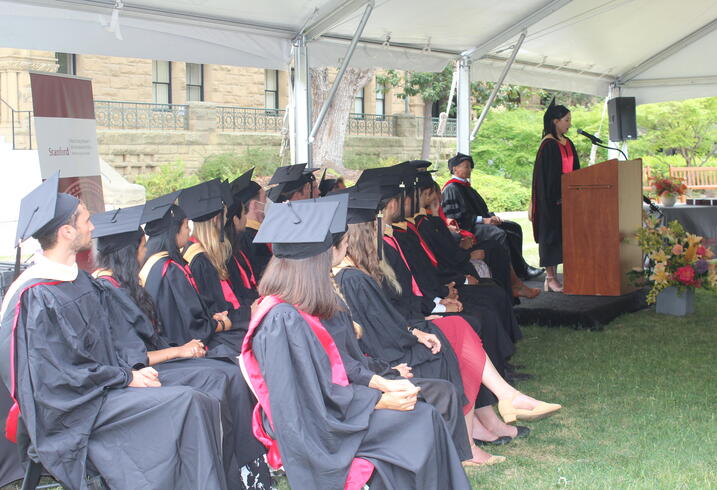
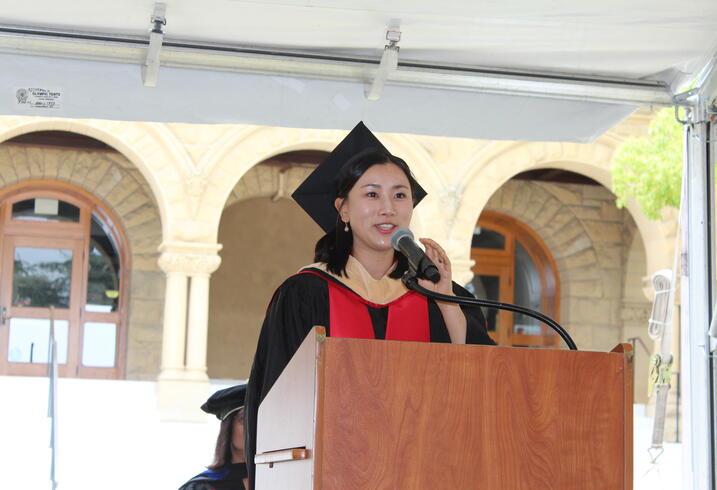

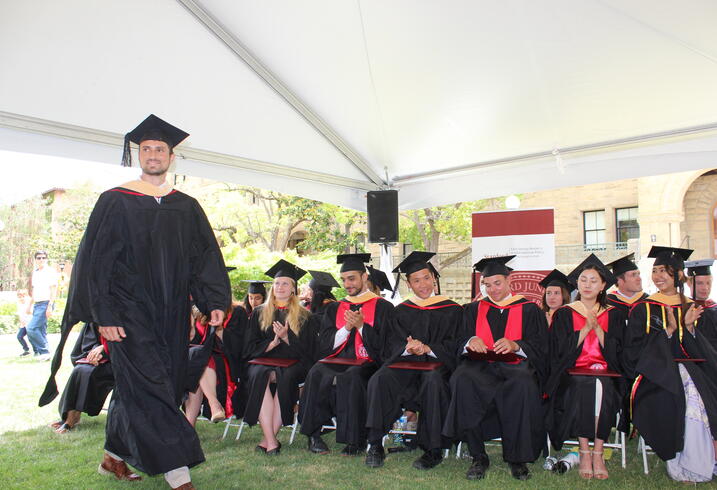

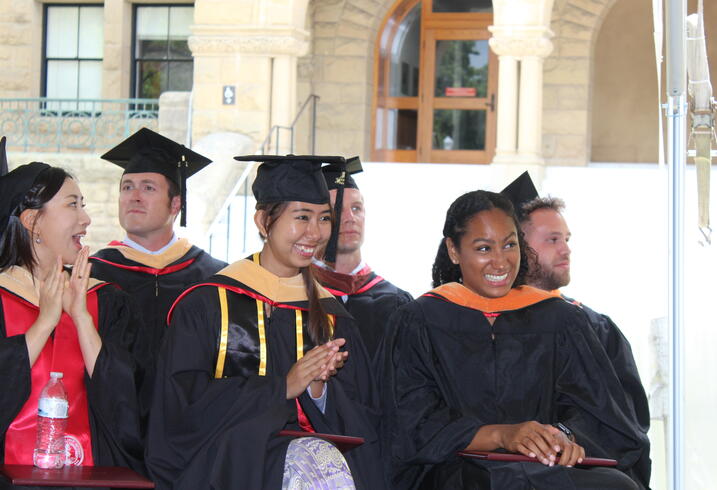


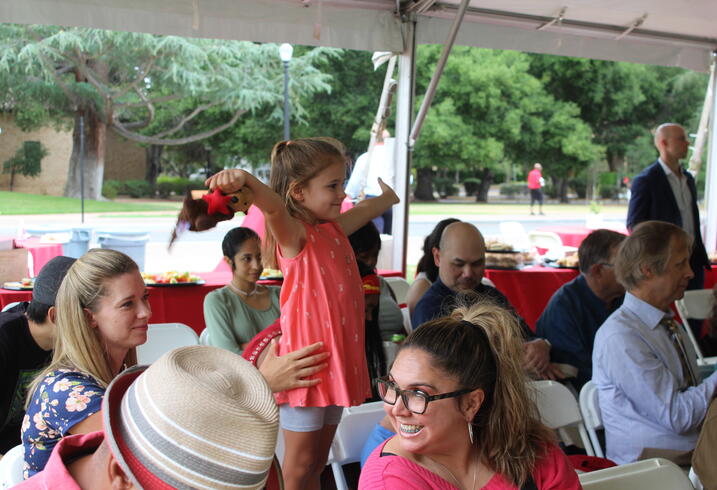
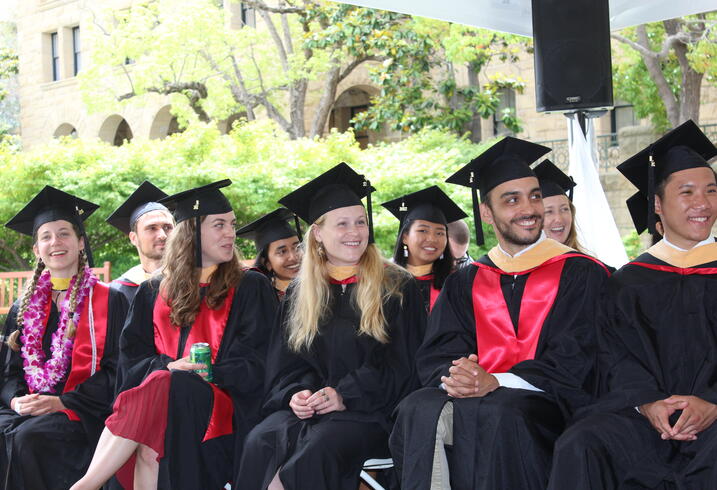






























 Student speaker Manuel Ramos Maqueda addresses his classmates at the MIP graduation ceremony June 16, 2019. Photo: Freeman Spogli Institute
Student speaker Manuel Ramos Maqueda addresses his classmates at the MIP graduation ceremony June 16, 2019. Photo: Freeman Spogli Institute
